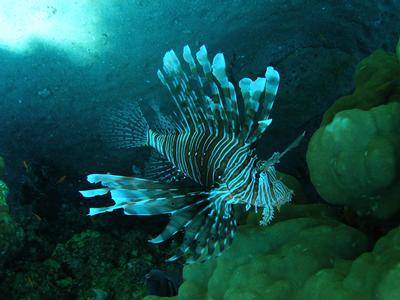The Indo-Pacific Lionfish is a voracious predator that, when introduced into a previously uninhabitated area, has the potential to adversely affect indigenous fauna.

When established, lionfish also have the potential to endanger human health and impact on recreation and tourism. Fadliah's work has shown that lionfish are present at a wide range of water depths and habitats, and that they have a board diet; their prey reference is neither size-dependent nor size-dependent. A lack of natural predators infers a need for effective eradiation methods to control populations in areas where lionfish have established; areas in the Caribbean not yet invaded by lionfish need to plan responses to pending invasions as a matter of urgency.
After graduation I started a PhD extending my work on Lionfish, supervised by Environmental Scientists and Oceanographers at the University of Southampton, with field work in the Caribbean. I have also returned to speak to undergraduates in the weekly seminar programme.